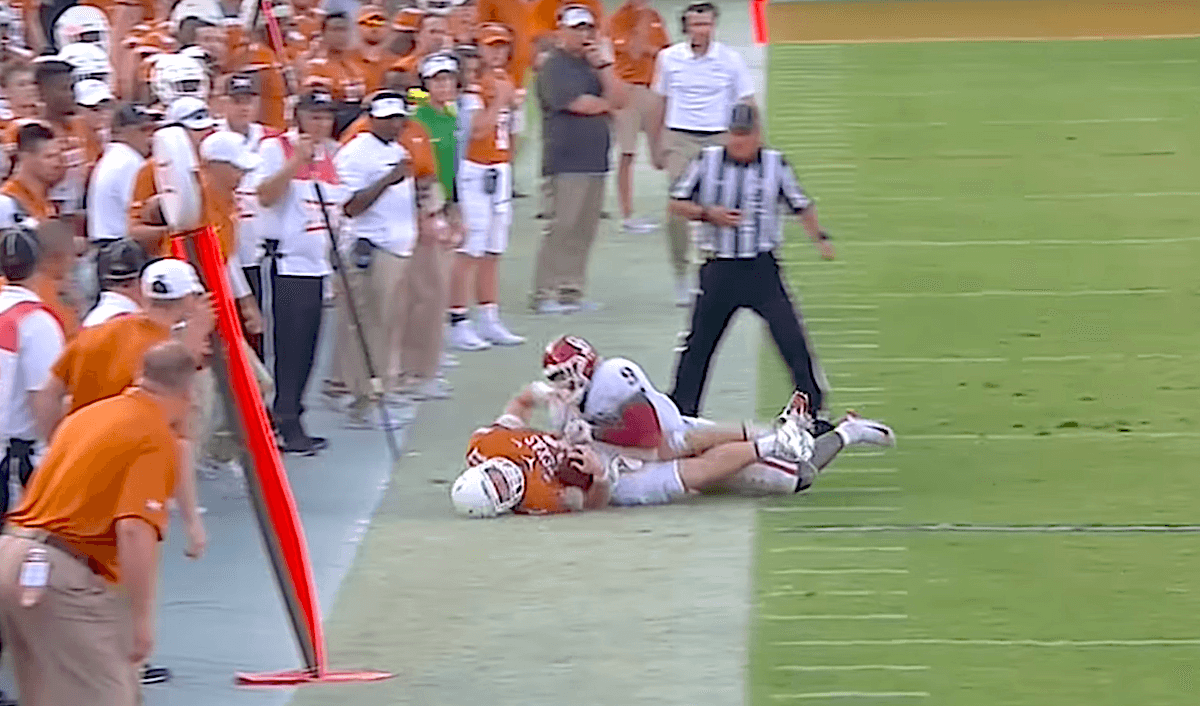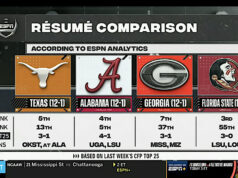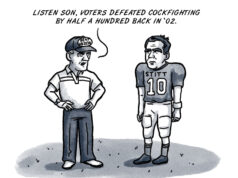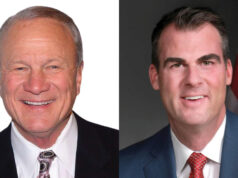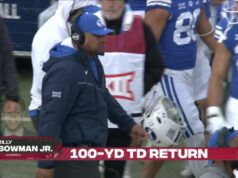Spotlighted by a brutal ESPN report about the culture of his program, Maryland head football coach DJ Durkin is the latest example of why college football needs higher ethical standards now more than ever.
Durkin, strength coach Rick Court, athletic trainer Wes Robinson and the University of Maryland itself are all likely to be sued over the death of 19-year-old offensive lineman Jordan McNair, who suffered heatstroke and a 106-degree body temperature while running more than 1,000 yards in sprints during a May practice.
The coaches will be lucky if they are not charged with manslaughter, as ESPN reporting on McNair’s death indicates a troubling time gap between the player suffering a seizure and a 5:58 p.m. 911 call being placed.
ESPN’s investigations — which relied heavily but not entirely on the granting of anonymity to current and former Maryland players and staff — were criticized Saturday by one of Durkin’s former bosses, current South Carolina head coach Will Muschamp.
But while Muschamp can claim Durkin “treats people with respect,” Durkin’s own words may haunt him, as he has previously described a reckless disregard for player safety that seems all the more despicable following McNair’s death and ESPN’s report.
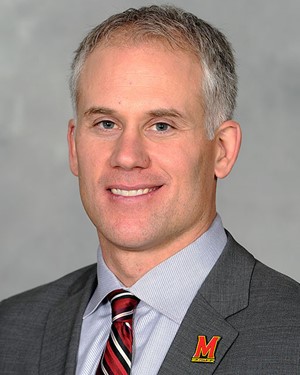
“We have a saying to our guys,” Durkin boasts in a Maryland Athletics video (above) from March 2016. “We say, ‘Let’s go as hard as we can as fast as we can for as long as we can, and don’t worry.'”
At the time he recorded the statement, Durkin was leading spring practices ahead of his first season at Maryland in 2016. In early August of that year, Durkin continued to preach his stern mindset, being quoted in a Carroll County Times article while instructing his players between components of practice.
“No one cares if you’re tired,” Durkin said. “We are trying to make it as hard as we can. (…) The heat makes cowards out of us all. We’re working on some mental toughness, and that’s what we are going to do.”
If a book is ultimately written on the death of Jordan McNair, Durkin’s fallacious philosophy could be used as foreshadowing.
Placed on administrative leave Saturday afternoon, Durkin has plenty of time to consider how his degrading and odious tactics yielded only a 10-15 record over the past two years. Meanwhile, the culture he set spurred Robinson to reportedly yell “drag his ass across the field” when McNair showed symptoms of heatstroke.
Paterno, Briles, Switzer and Miles
Durkin’s destiny aside, college football deserves ethical scrutiny for numerous other coaching scandals, big and small. Following a sad series of investigative reports, Americans have more than enough examples of how often the men hired by universities to lead football programs and shape kids’ lives fail at balancing the ethical needs of humans with the desires and pressures for winning games.
Penn State administrators and legendary coach Joe Paterno failed to report an assistant coach who was molesting children. Similarly, renowned offensive guru and former Baylor University coach Art Briles also failed to report a known incident of sexual assault involving one of his players. Further, Briles and Baylor University as a whole oversaw a program that featured 19 players accused of sexual assault in under a decade.
More recently, Ohio State coach Urban Meyer appears to have lied to media when asked whether he was aware of Courtney Smith’s 2015 allegation of domestic violence against her husband, assistant coach Zach Smith. Meyer remains on administrative leave during an investigation that should determine whether the Smith situation will prove to be the champion coach’s hamartia.
More locally, University of Oklahoma football fans long ago attempted to forget the 1989 demise of Barry Switzer’s collegiate coaching tenure. If you need a refresher of just how outrageous — and criminal — things got in Norman, Sports Illustrated’s coverage from the time is worth a read.
Speaking of that publication, let’s not forget Oklahoma State’s awkward moment in the national spotlight owing to the early 2000s management of then-head coach Les Miles. While university defenders used corrections issued by Sports Illustrated to damage the credibility of the five-part series, SI’s narrative itself could only be critiqued by arguing that everyone already knows college football programs chew up and spit out student athletes when they are no longer part of a winning equation.
RELATED
Editorial: Ignoring Texas QB Sam Ehlinger’s head trauma by William W. Savage III
Overshadowing all of these programs and the entirety of football, however, is the issue of concussions. Last year, University of Texas head coach Tom Herman received only minimal criticism after he and program staff disregarded obvious head trauma sustained by quarterback Sam Ehlinger.
Meanwhile, a class action lawsuit against the NCAA about concussions has a status hearing scheduled for Thursday, after which parties will hold a “final fairness” hearing on a proposed settlement.
Prioritize ethical behavior to save the game
If the comments section of our concussion editorial last year is any indication, some readers of this piece could perceive that we are arguing “the game should be illegalized.”
Most certainly, we are not.
Instead, we are encouraging college football fans, players, coaches and university administrators to push forward with a commitment to prioritize ethical behavior — and student athlete safety — over everyone’s desire to win. Simply saying the right things is apparently not enough for many college football coaches to avoid scandalous downfall. Public complacency about and normalization of college athletics as inherently dangerous or cheekily corrupt must stop.
Regarding the University of Maryland, its leaders’ own past statements stand as examples of the problem, and they go far beyond coach Durkin’s “don’t worry” mantra.
Roughly 15 months ago, in April 2017, University of Maryland President Wallace Loh commented on the University of North Carolina Athletic Department’s academic scandal. In discussing the matter, Loh candidly noted that a university president naturally presides over “a number of dormant volcanoes.”
Don’t let the scalding lava of Mt. DJ Durkin burn your trousers, Mr. President.









